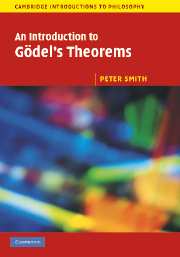Book contents
- Frontmatter
- Contents
- Preface
- 1 What Gödel's Theorems say
- 2 Decidability and enumerability
- 3 Axiomatized formal theories
- 4 Capturing numerical properties
- 5 The truths of arithmetic
- 6 Sufficiently strong arithmetics
- 7 Interlude: Taking stock
- 8 Two formalized arithmetics
- 9 What Q can prove
- 10 First-order Peano Arithmetic
- 11 Primitive recursive functions
- 12 Capturing p.r. functions
- 13 Q is p.r. adequate
- 14 Interlude: A very little about Principia
- 15 The arithmetization of syntax
- 16 PA is incomplete
- 17 Gödel's First Theorem
- 18 Interlude: About the First Theorem
- 19 Strengthening the First Theorem
- 20 The Diagonalization Lemma
- 21 Using the Diagonalization Lemma
- 22 Second-order arithmetics
- 23 Interlude: Incompleteness and Isaacson's conjecture
- 24 Gödel's Second Theorem for PA
- 25 The derivability conditions
- 26 Deriving the derivability conditions
- 27 Reflections
- 28 Interlude: About the Second Theorem
- 29 µ-Recursive functions
- 30 Undecidability and incompleteness
- 31 Turing machines
- 32 Turing machines and recursiveness
- 33 Halting problems
- 34 The Church–Turing Thesis
- 35 Proving the Thesis?
- 36 Looking back
- Further reading
- Bibliography
- Index
34 - The Church–Turing Thesis
Published online by Cambridge University Press: 05 June 2012
- Frontmatter
- Contents
- Preface
- 1 What Gödel's Theorems say
- 2 Decidability and enumerability
- 3 Axiomatized formal theories
- 4 Capturing numerical properties
- 5 The truths of arithmetic
- 6 Sufficiently strong arithmetics
- 7 Interlude: Taking stock
- 8 Two formalized arithmetics
- 9 What Q can prove
- 10 First-order Peano Arithmetic
- 11 Primitive recursive functions
- 12 Capturing p.r. functions
- 13 Q is p.r. adequate
- 14 Interlude: A very little about Principia
- 15 The arithmetization of syntax
- 16 PA is incomplete
- 17 Gödel's First Theorem
- 18 Interlude: About the First Theorem
- 19 Strengthening the First Theorem
- 20 The Diagonalization Lemma
- 21 Using the Diagonalization Lemma
- 22 Second-order arithmetics
- 23 Interlude: Incompleteness and Isaacson's conjecture
- 24 Gödel's Second Theorem for PA
- 25 The derivability conditions
- 26 Deriving the derivability conditions
- 27 Reflections
- 28 Interlude: About the Second Theorem
- 29 µ-Recursive functions
- 30 Undecidability and incompleteness
- 31 Turing machines
- 32 Turing machines and recursiveness
- 33 Halting problems
- 34 The Church–Turing Thesis
- 35 Proving the Thesis?
- 36 Looking back
- Further reading
- Bibliography
- Index
Summary
Right back in Chapter 2 we stated Turing's Thesis: a numerical (total) function is effectively computable by some algorithmic routine if and only if it is computable by a Turing machine. Of course, we initially gave almost no explanation of the Thesis. It was only very much later, in Chapter 31, that we developed the idea of a Turing machine and saw the roots of Turing's Thesis in his general analysis of the fundamental constituents of any computation.
Meanwhile, in Chapter 29, we had already introduced the idea of a µ-recursive function and noted the initial plausibility of Church's Thesis: a numerical (total) function is effectively computable by an algorithmic routine if and only if it is µ-recursive.
Then finally, in Chapter 32, we outlined the proof that a total function is Turing computable if and only if it is µ-recursive. Our two Theses are therefore equivalent.
Given that equivalence, we can now talk of
The Church–Turing Thesis The effectively computable total numerical functions are the µ-recursive/Turing computable functions.
Crucially, this Thesis links what would otherwise be merely technical results about µ-recursiveness/Turing computability with intuitive claims about effective computability; and similarly it links claims about recursive decidability with intuitive claims about effective decidability. For example: it is a technical result that PA is not a recursively decidable theory. But what makes that theorem really significant is that – via the Thesis – we can conclude that there is no intuitively effective procedure for deciding what's a PA theorem.
Information
- Type
- Chapter
- Information
- An Introduction to Gödel's Theorems , pp. 315 - 323Publisher: Cambridge University PressPrint publication year: 2007
